PHOTOS: Before & After - How HNK Afterhours Lost Its Cool
ZAGREB October 13, 2020 – Since early June 2020, the Croatian National Theatre Zagreb has served as a nightly meeting point for the city's youths. In these pictures and video we see the incredible youth phenomenon as it once was and also how HNK afterhours lost its cool
Built in 1895, the Croatian National Theatre Zagreb (HNK Zagreb) is one of the finest pieces of architecture in a city not short on fine Austro-Hungarian buildings. Sitting in the middle of Republic of Croatia Square, it is the focal point of Lower Town. A multi-purpose space, it has world-class opera and ballet companies in-house. © David Bakarić
© David Bakarić
This week, several media outlets have reported on the gathering of youths outside the theatre, especially on weekend nights. While an interesting read, including the thoughts of a sociologist, these stories are a bit out of date. Because the truth is, the party is over - HNK afterhours lost its cool many weeks ago.
BEFORE © Marc Rowlands
© Marc Rowlands
In early June, when the three-month Coronavirus lockdown finally ended, HNK Zagreb became the de facto meeting point for Zagreb youth. It all happened rather spontaneously. There were no advertisements. Word spread from peer-to-peer and young people from as far away as Rijeka, Ivanic-grad and Zabok made the journey to take part in the youth culture phenomenon. © David Bakarić
© David Bakarić © Marc Rowlands
© Marc Rowlands
It was a joyful scene - thousands of people from every youth tribe imaginable; punk and metal fans, sports students, classical musicians, football fans, young patriots, LGBT teens, devout Christians and kids who would usually go to the cajke (folk music) club sat side-by-side. It was good-natured. Everyone was glad to be out of the house and be able to meet their peers. Everyone got along. © David Bakarić
© David Bakarić © David Bakarić
© David Bakarić © David Bakarić
© David Bakarić © David Bakarić
© David Bakarić
Impromptu theatre performances and music concerts took place. Soundsystems were set up. There was laughter, music, dancing and all round good cheer. © David Bakarić
© David Bakarić © David Bakarić
© David Bakarić
'We are extremely happy and positive that our theatre has been recognized as a place of gathering and sharing positive vibrations between generations,' an official from the Croatian National Theatre Zagreb told this journalist when approached to comment on HNK afterhours. 'Ever since 2014, our hope was to create a warm and welcoming feeling here for everybody, for all age groups and different audiences; to make theatre alive outside the building walls.' Responsible young partygoers cleaned up after themselves in early June. Those cool kids have long since disappeared from HNK afterhours © David Bakarić
Responsible young partygoers cleaned up after themselves in early June. Those cool kids have long since disappeared from HNK afterhours © David Bakarić
AFTER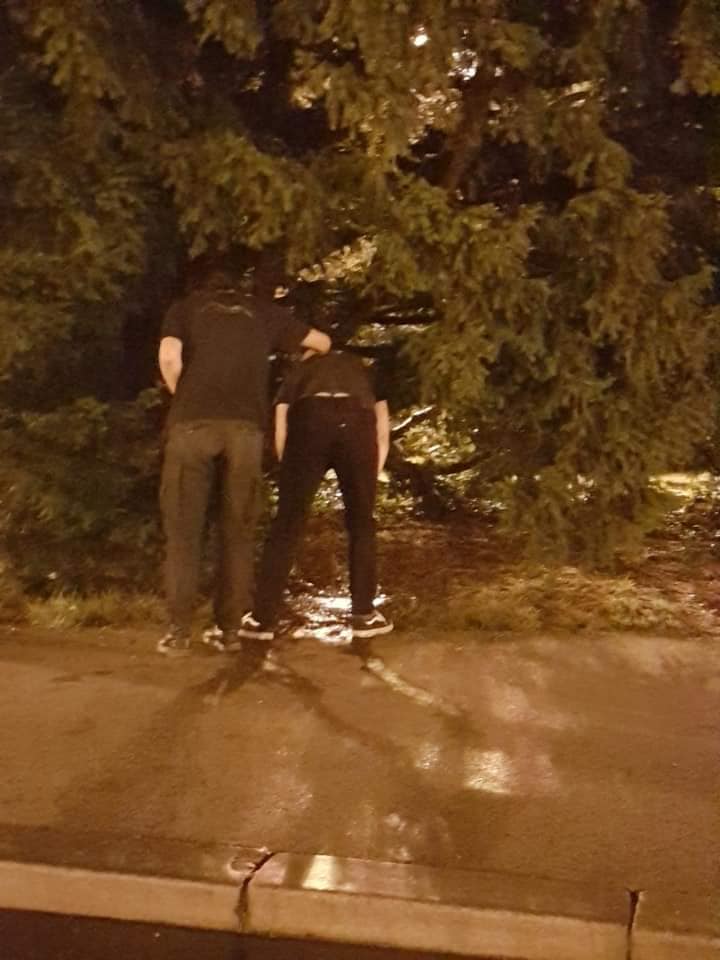
HNK afterhours lost its cool many weeks ago. Becoming an expected rather than a spontaneous gathering was perhaps its death knell. That, and the fact that although everyone knew hundreds were gathering there, no provisions were made for these socialising young people. With no other option on Republic of Croatia Square, the bushes and gardens around the theatre became their toilets.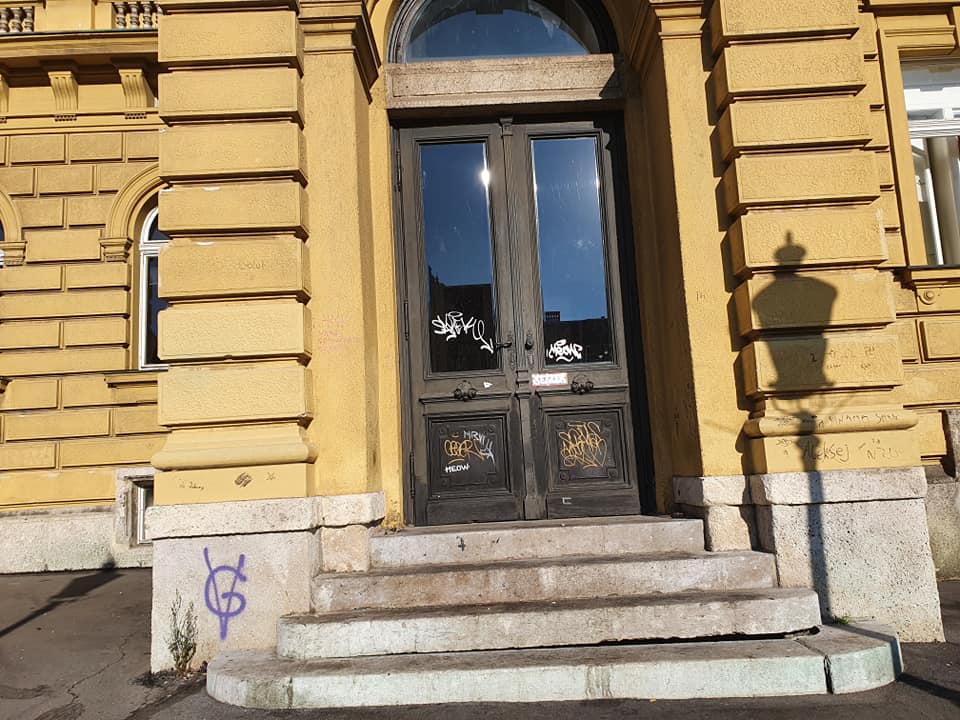
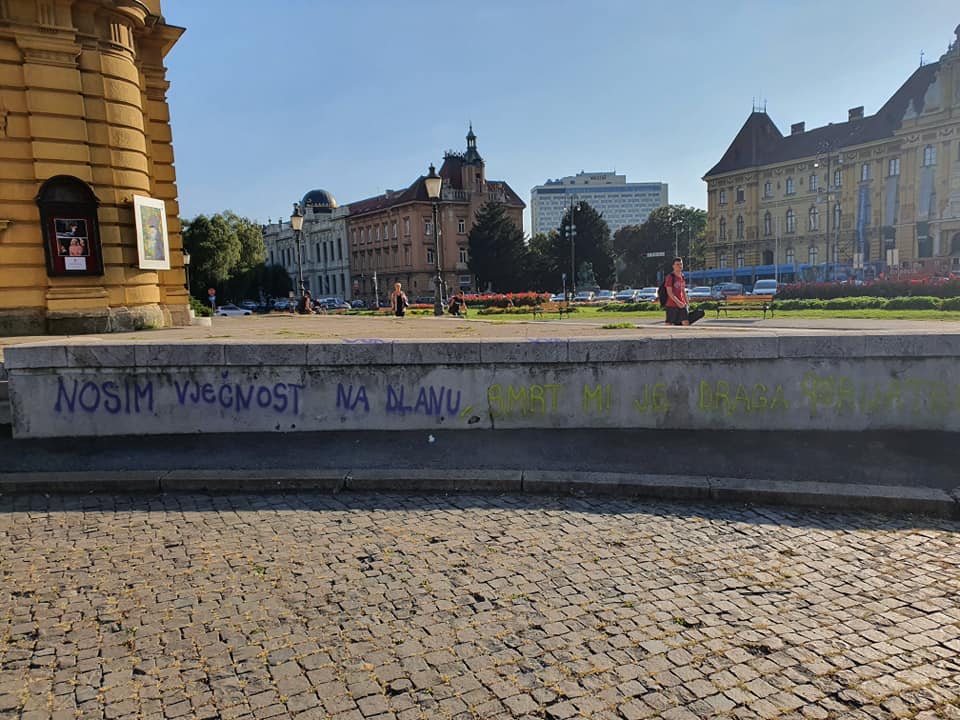
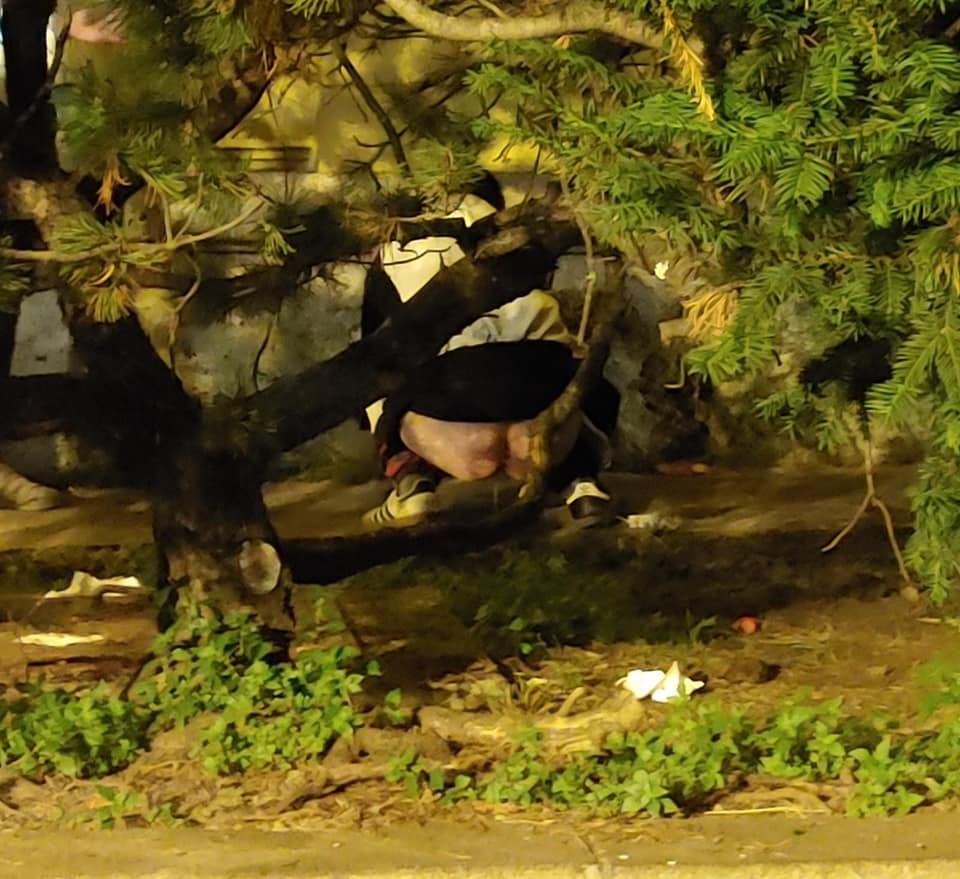
It was instantly noticeable when HNK afterhours lost its cool - all of the cool kids just stopped coming. What was once a representation of all the city's youth tribes dwindled to a hardcore few hundred of late-night drinkers with nothing better to do and no place else to go. The theatre and most of the music stopped.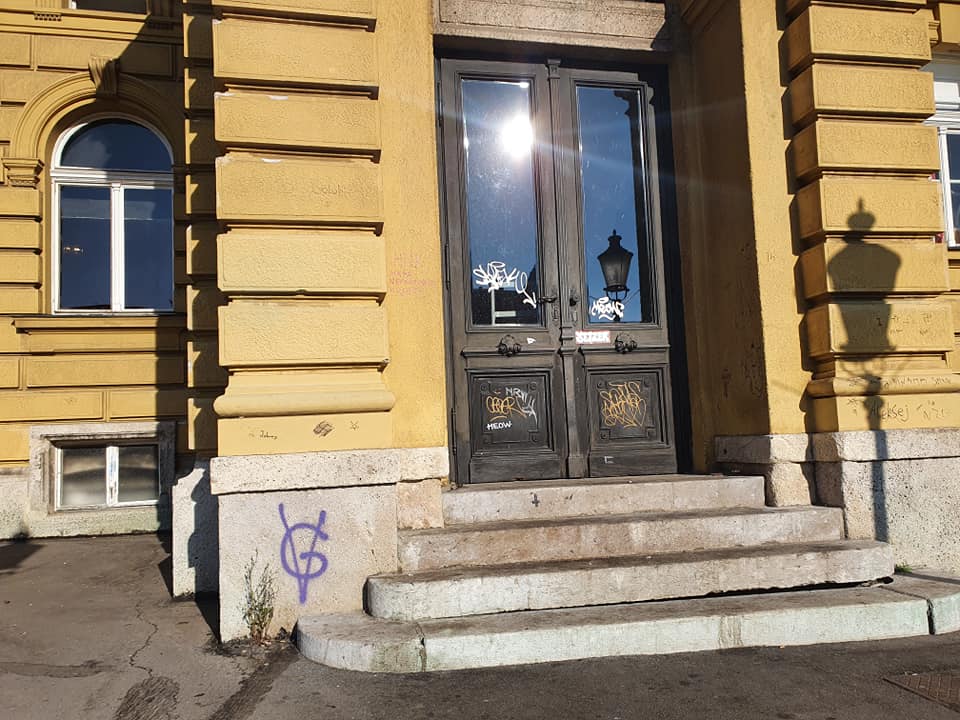
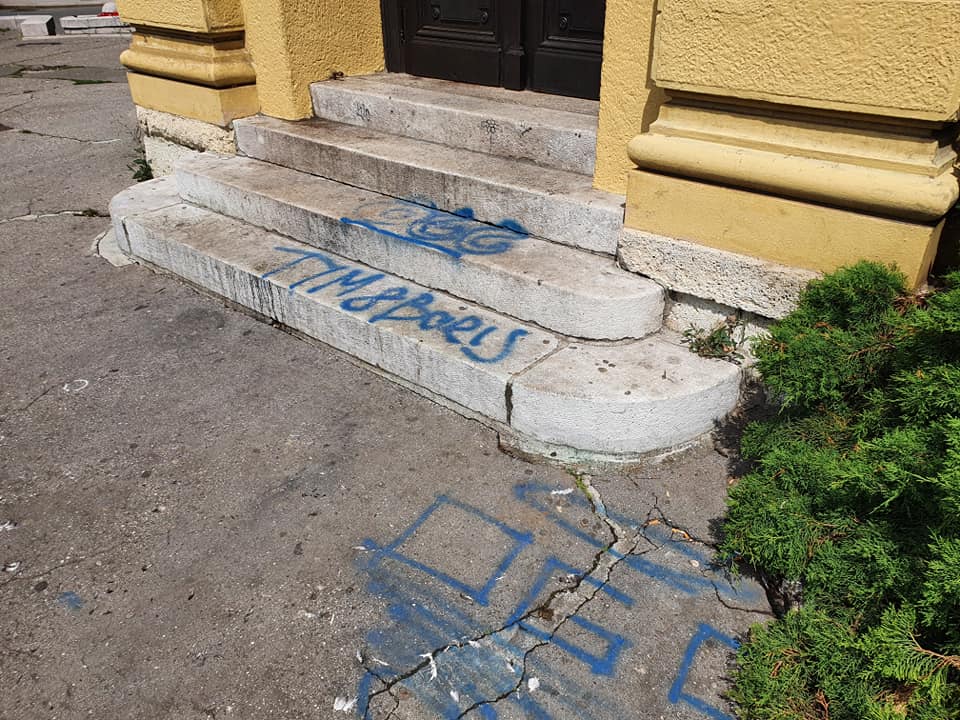
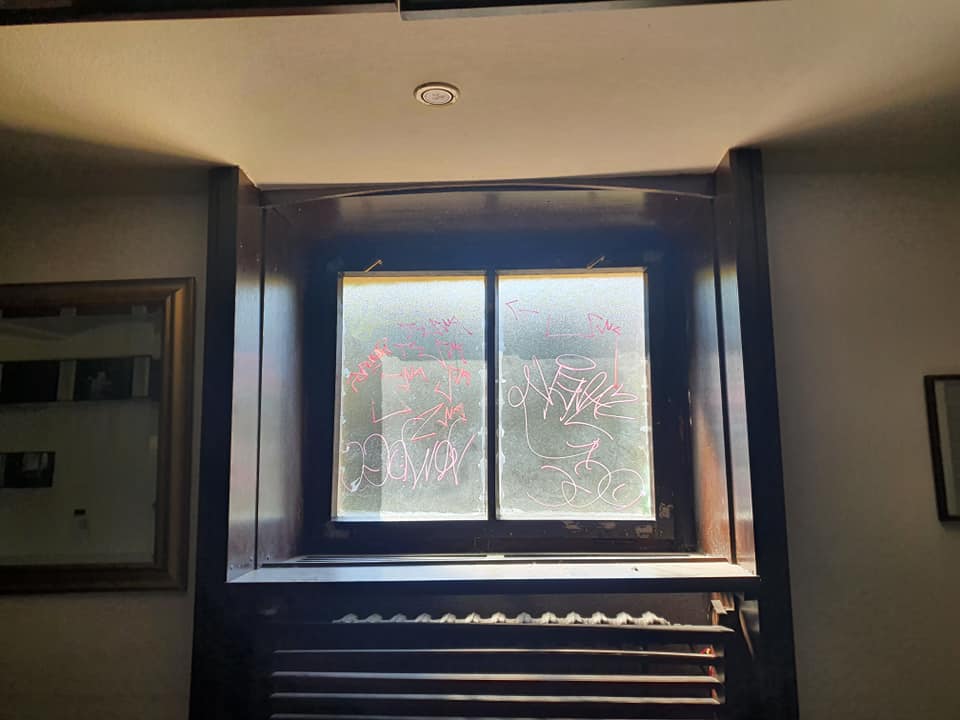
Then the violence, graffiti and vandalism began. The excessive drinking was one major sign of youth insecurity – people not entirely comfortable with themselves within large groups got drunk to ease their discomfort. Then, they threw up in the bushes. But the violence and graffiti were greater signs of insecurity and immaturity.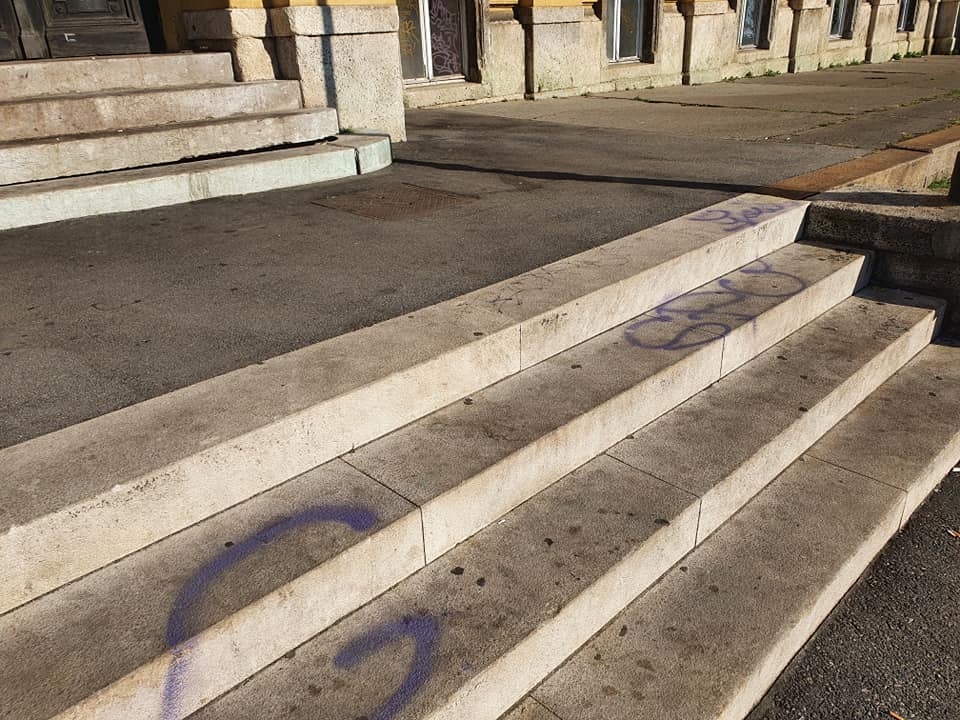
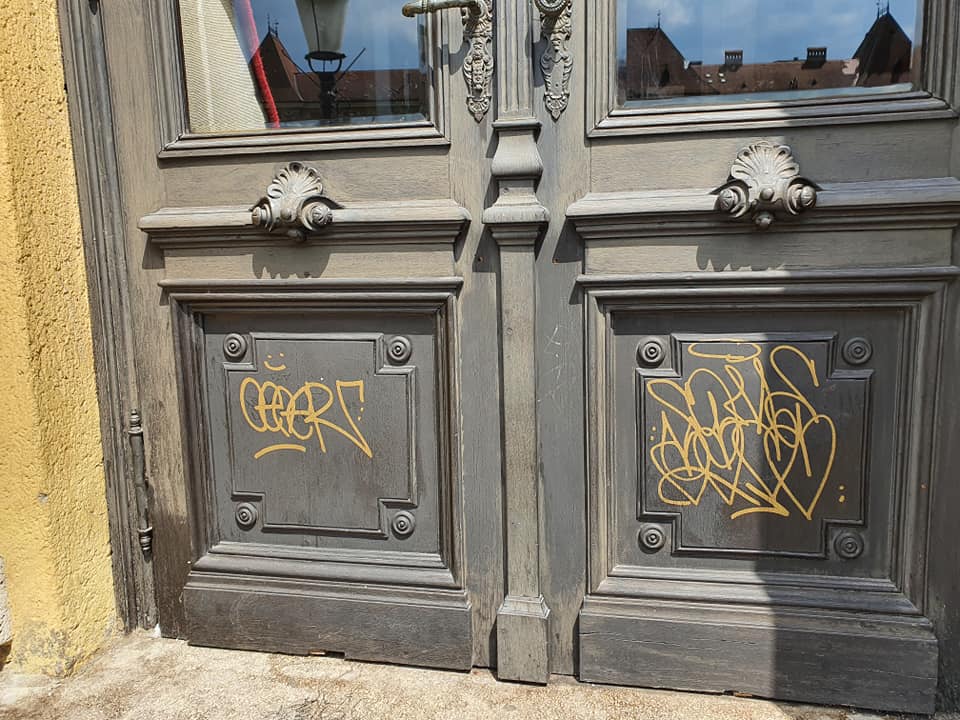
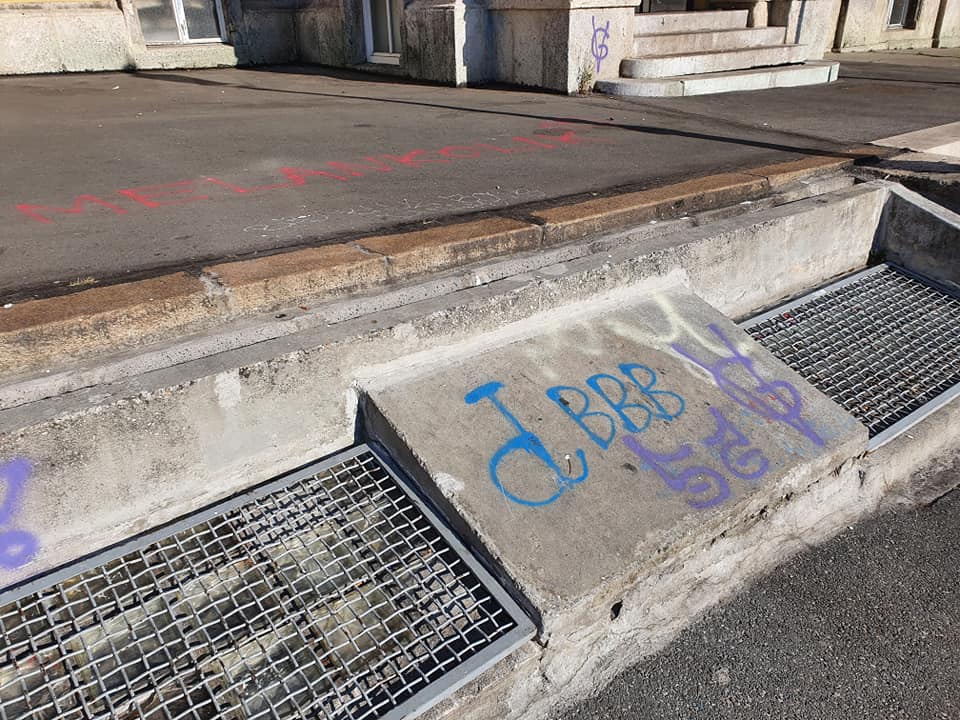
Like dogs urinating on street corners to mark their territory, mindless graffiti 'tags' appeared all over the Croatian National Theatre Zagreb – its steps, its windows, its antique doors. In an effort to leave a permanent mark, the insignificant few seemed determined to destroy everything that had once been joyful and good-natured about this gathering.
Zagreb police intervene when one drunken male started to physically abuse some of his peers. Present at the scene, this journalist commented to a friend that the police had acted bravely. The peer commented that the police had looked scared. They were surrounded by hundreds of spectators to the violence.
You can now guarantee there will be some violence outside the theatre on every weekend night. Zagreb police, who have shown remarkable patience and restraint throughout the whole phenomenon, sit far from the crowd and let the youngsters party. However, Zagreb Police Administration have said that from May 1 to September 30, the police intervened around the Croatian National Theatre Zagreb about 50 times, based on allegations of possible disturbance of public order and peace. In an effort to perhaps try and understand the frustrations of youths at this time, they have filed misdemeanor charges against only six people. This, despite a small, insecure and immature male section of the crowds flexing their muscles against smaller peers – or the police themselves – on a nightly basis. A small cabal of latecomers are ruining the reputation of a youth culture movement which deserves to be much better remembered.
 A young man shows the marks around both eyes that he received in an unprovoked attack at HNK afterhours on the weekend of 9 October 2020
A young man shows the marks around both eyes that he received in an unprovoked attack at HNK afterhours on the weekend of 9 October 2020
When you're young, it can be difficult to hear that the party is over. After you've had such a good time, you don't want to go home. You want the good times to last forever. But, this party is well and truly finished. HNK afterhours lost its cool many, many weeks ago. It is a rather sad remnant of something that was beautiful while it lasted. But, now it is time for the party to move elsewhere or for the attendees to go home. This beautiful building, its grounds and surrounding residents have played host for long enough. They each deserve a break.
The use of uncredited photographs in this article was granted on condition that the submitting photographers remain anonymous
For the latest travel info, bookmark our main travel info article, which is updated daily.
Read the Croatian Travel Update in your language - now available in 24 languages.
NGOs, Police Focus on Problem of Domestic Violence
ZAGREB, September 20, 2020 - Associations which protect victims of domestic violence have been registering more and more requests for help on a daily basis, notably since the lockdown caused by the coronavirus epidemic, when many victims were forced to spend all of their time with their abusers.
Even though official statistics show a mild decline in the number of cases of domestic violence, police are not ignoring the problem.
They point to the fact that a growing number of such cases are now reported as felonies and not as misdemeanors and call on all who have witnessed domestic violence to report it without delay, including anonymously.
Anita Matijevic of the Police Directorate has said in an interview with Hina that the number of misdemeanors and felonies connected with domestic violence dropped by 2.7% in the first eight months of 2020 from the same period of 2019.
She noted that the number of domestic violence misdemeanors had decreased by 11% or 1,133 fewer cases.
"At the same time, there has been a 42% increase in domestic violence cases treated as felony," she said, noting that this year police have acted in 9,220 cases related to domestic violence and that those cases had the characteristics of either a misdemeanor or a felony.
Perpetrators increasingly prosecuted for committing felony
Matijevic noted that in the same period of 2019 there were 9,483 cases of domestic violence, 3% or 260 cases more than this year.
This year has seen an increase in the number of cases of violence treated as a felony because police have been trying to make sure all offences that can be prosecuted as a felony are prosecuted as such.
Associations flooded with calls for help
Livija Plancic, head of the Bijeli Krug nongovernmental organisation, which helps victims of violence, warns that the problem of growing domestic violence has been aggravated by the coronavirus crisis as victims were forced to spend entire days with their abusers.
Apart from a mentality in which relations, mostly between men and women, are perceived in a strange way, domestic violence is also triggered by alcohol and drugs as well as by an increasingly difficult financial situation, Plancic said, adding that police were the first to come into contact with the victims and that they should be the ones to provide protection the fastest.
Tools for victim protection not used sufficiently
She believes, however, that police do not use sufficiently instruments of victim protection, from a restraining order to removal from the common household, and calls for maintaining professional education to increase the level of competence of those who deal with victims and witnesses, from judges, prosecutors, attorneys, social workers and representatives of nongovernmental organisations to police officers.
On September 22 Croatia marks the national day of the fight against violence against women, commemorating a brutal murder which happened in 1999 when a man killed his wife, a judge and an attorney and severely wounded a court reporter, all women, during divorce proceedings.
For the latest travel info, bookmark our main travel info article, which is updated daily.
Read the Croatian Travel Update in your language - now available in 24 languages
Firefighters Malinois Belgian Shepherd Sniffs Out Wanted Man in Split
Saturday, 5 September 2020 – More than 100 policemen were searching for the escaped man, but in the end it was a firefighters Malinois Belgian Shepherd that sniffed him out.
When detainee Branimir Čaleta managed to escape from custody on September 2, armed police were immediately on his tail. They knew where to look – he was seen running in the direction of Turska kula and the Park Mladosti in Split, near the Poljud football stadium.
But, though more than 100 officers were searching for the wanted man, in the end, it was a firefighters Malinois Belgian Shepherd called Flip that sniffed him out.
The Malinois Belgian Shepherd is used by armed services, the police and for search and rescue all over the world © TC Perch
Details of Flip's assistance were revealed in an interview undertaken with the dog's handler, Split firefighter Joško Čule by the 24 sata news outlet. Although he was not allowed to reveal details of the fugitive's capture, Joško did speak about his dog.
Flip is a search dog of the Public Fire Brigade of the City of Split, a firefighters Malinois Belgian Shepherd. He was trained to search in all environments, from urban areas and ruins to wild nature, and in all weather conditions. He is a family dog, loves spending time with children, and with the firefighters. He is an active member of the firefighting team in Split and works every day. Flip is taken into the field when necessary and has so far participated in four searches for lost people. He found them all.
This firefighters Malinois Belgian Shepherd is just one of the types of Belgian Shepherd. The other three are called Groenendael, Laekenois, and Tervuren. In Belgium, their country of origin, all four types are considered to be varieties of a single breed, differentiated by hair color and texture. Elsewhere, they are sometimes considered separate breeds.
Flip, the firefighters Malinois Belgian Shepherd is typical in having tan to brown short hair with patches of black. Belgian Shepherd Dogs are highly intelligent, alert, and sensitive to everything going on around them, and they form very strong relationship bonds. They are loyal, intelligent, fun, make good family pets and are very receptive to being trained, thus explaining the position of this firefighters Malinois Belgian Shepherd.
A Belgian Shepherd with a close relative, a Dutch Shepherd © Marius Zopole
It is not only firefighters who use these dogs. They are used as search and rescue dogs by other services and as police and military dogs. They have a good reputation as sniffer dogs, particularly in the field of finding illegal drugs. Several Malinois Belgian Shepherds have been decorated for bravery. They are very protective of their owners and handlers.
The US Secret Service, Israel Defense Forces, Indian NSG commando unit and Royal Australian Air Force use Malinois Belgian Shepherds in their work. The breed is second in number only to the German Shepherd for use across the whole of the US Armed Forces.
The fugitive Branimir Čaleta ran away from police while he was at court in Split, where he was appearing charged with the murder of his one-time girlfriend, a Ukrainian national. Čaleta is now back in custody, thanks to Flip, the firefighters Malinois Belgian Shepherd.
For the latest travel info, bookmark our main travel info article, which is updated daily.
Read the Croatian Travel Update in your language - now available in 24 languages
Police to Once Again Conduct Special Traffic Programme for Start of School Year
ZAGREB, September 4, 2020 - As the new school year is about to start, the police will once again conduct a special traffic programme to protect children which has been ongoing since 1995 and has resulted in significantly fewer deaths and injuries to children on Croatian roads.
Regardless of the positive trend, in the past ten years 66 children were killed in traffic and another 10,172 were injured, the Interior Ministry said on Friday.
Nevertheless, it is worrying that fifteen years ago most child victims were pedestrians while now they are passengers in vehicles while riding with their parents, even though these are the people they should be safest with.
The number of children killed in traffic has decreased by 40 percent, which in numbers means that this year three children were killed compared to five children in the same period last year. However, 3.4% more children were seriously injured in traffic while those sustaining mild injuries decreased by 24.8%. Most of these incidents involved children as passengers in cars.
The police appeal to parents to ensure that all children have their seat belts fastened in cars.
40,000 new participants in traffic
This year there will be about 40,000 children starting school, which means that many more participants in traffic, and the police, together with local authorities, will conduct special checks of roads and traffic signs in the vicinity of schools as well as stepping up speed checks.
For the latest travel info, bookmark our main travel info article, which is updated daily.
Read the Croatian Travel Update in your language - now available in 24 languages
MUP to Obtain Facial Recognition Technology Despite Potential EU Ban
As Poslovni Dnevnik/Bernard Ivezic writes on the 21st of January, 2020, the European Union (EU) wants to ban the use of facial recognition technology within five years, but in spite of that, the Croatian Ministry of the Interior (MUP) has announced a tender for the adoption of such technology so that it can profile all citizens of Split in a mere two minutes and all citizens of Zagreb in just ten minutes.
Alphabet, the company that earns the most revenue from the use of artificial intelligence in online advertising and develops some of the most widespread AI technologies in the world, including those built into Android mobile phones, has called on the US and the EU to regulate AI and bring it into line properly. Alphabet CEO Sundar Pichai posted a comment in the Financial Times (FT) stating that it is not questionable whether AI should be regulated, and that the question rests solely on how to approach it.
"Companies like ours can not only develop new, promising technologies and let the market decide how they will be used, it's fundamental for us to ensure that the technologies we've developed are used for good and are accessible to everyone," Pichai wrote.
The United States and the European Union are already preparing artificial intelligence regulations. While the US proposes a soft approach, the EU is considering totalling banning the use of AI-based face recognition technology within the next five years to help the bloc's extensive legislature keep up with the advances and applications of such technology.
The EU took that route after China demonstrated that facial recognition technology, paired with access to all cameras in China's public and private space, could be used not only to search for criminals but also to fully track the movements and behaviour of its citizens, which is a gross invasion of privacy.
In one of the richest EU member states, the United Kingdom, a regulator has launched an investigation against a developer called Argent over the use of facial recognition technology on cameras in London's King's Cross, also known as St. Pancras from which the Eurostar train departs for both Paris and Brussels.
The investigation came about after the media found out that Argent was recording and profiling tens of thousands of citizens on a daily basis, and entirely without their knowledge. This is a particularly sensitive issue in London, which has the most cameras in public spaces in all of Europe, more than half a million of them, already used by police to prevent crime and search for criminals.
MUP appears unaffected by the negativity surrounding such technology, and recently MUP announced a tender worth 2.8 million kuna through which it seeks out facial recognition software that would enable it to identify the faces of 3000 citizens in mere seconds.
Pichai is naturally concerned that the US and the EU have started to regulate AI in different directions. All major companies, including Alphabet's Google, then Amazon, Microsoft, Facebook and Apple are developing their own AI technology offers and are already offering it to some extent or another here in Croatia as cloud services.
For more on MUP, follow our dedicated lifestyle page.
Croatian Ministry of the Interior (MUP) Obtaining Million Euro Equipment
Cybercrime is a growing problem in our ever more technologically minded modern society, and MUP is catching up, too.
As Poslovni Dnevnik writes on the 8th of January, 2020, the Croatian Ministry of the Interior (MUP) has begun implementing the project called ''Strengthening MUP's Capacity to Combat All Forms of Cybercrime '', in which it will procure equipment worth almost one million euros and educate police officers on how to successfully combat cybercrime.
A statement from MUP claims that the decision to award the project implementation funding was made by the Schengen Coordination and EU Funds Independent Sector, and the project will procure equipment and computer programs that will allow for the efficient execution of court orders to search holders of electronic evidence such as computers, laptops, tablets, hard drives, mobile (cell) phones and more.
In addition, 31 police officers will be intensively trained to raise their competencies for successfully combating cybercrime in Croatia. The topics of education will be the basics of attack and protection of information systems and information security, architecture, models, mechanisms and principles of information technology, digital traces, evidence and forensics, as well as prevention, surveillance and more specialised areas of cyber-attacks.
The allocation of funding for these projects is based on the exclusive competence of the Cyber Security Police Crime Service, with a total estimated budget of 995,000 euros with VAT, while the European Union's co-financing percentage stands at ninety percent of that figure in total.
MUP has stated that the training of the police officers, which was based on a previously conducted public tender, has been being conducted by the Algebra Tenderer Community d.o.o. and the Zagreb Faculty of Electrical Engineering and Computing from November 2019, and will continue until February this year.
Make sure to follow our dedicated lifestyle page for much more on MUP, crime, policing and the judiciary in Croatia.
Police Determined to Find Cruel Owner of Donkey Abandoned on Ravan
Animal cruelty unfortunately knows no borders and no bounds. With countless disgusting acts towards animals carried out by humans on a daily basis across the whole world, it's our duty as decent humans to try to do the right thing and step in when we can. One cruel donkey owner obviously decided their donkey was no longer of any use to them, abandoning her on the island of Ravan in the Šibenik archipelago in the heat with no food or water.
It seems, however, thanks to the media and to the general public, that this poor donkey is going to enjoy a happy end to her unfortunate story written by heartless individuals.
As Morski writes on the 18th of June, 2019, ust nine hours after an article about a poor, abandoned donkey on the island of Ravan in the Šibenik archipelago was published, the police responded that they had launched a search of the cruel owner who abandoned the poor creature on Ravan, and the Tribunj Tourist Board have openly stated that they are more than willing to do everything in their power to save the life of the donkey, and take care of her themselves.
From the police administration of Šibenik-Knin County comes a notice stating:
''Regarding today's mail from you regarding the stranded donkey on the island of Ravan, we'd like to inform you that the police, based on the received mail, are conducting a police investigation in order to determine and locate the owner of the animal in question, and all other circumstances related to this event.''
Nikola Perkova from the Tribunj Tourist Board, a place known for its care for the donkeys, was also contacted:
"We have a donkey farm and it's possible for us to accommodate her, but I'm worried about the legal status of going and taking this unfortunate animal awat from the island, since we don't know if there's an owner who might react.''
However, if the police manages to establish the criminal responsibility of the owner who abandoned the poor animal on Ravan without any food or water, they could insist, under Article 205, paragraph 1 of the Criminal Code, punish the wrongdoer with imprisonment for up to one year.
''Here with us in Tribuj there are donkeys from that island and from the island of Logorun, and if necessary, we'll make sure that this donkey, who seems to me to be pregnant, is saved from the torture of this heat,'' Perkov promised.
Meanwhile, a reader of the Morski portal who initially discovered the abandoned and possibly pregnant donkey stated:
''The animal is very sweet. She immediately approaches people and she asks for help. During the first meeting and before we were even anchored, she came down to the shore and began to call out to us. After we had fed her and gave her some bread and fruit, and went back to the ship, she followed us and tried to wade into the sea calling out to us sadly again. I can't stand to do nothing now, I'm going from Vodice out to the island again. I'll cut out a 25 litre canister to give her water, and bring her carrots and something else to eat. Thanks to all for the measures taken,'' said the obviously upset reader.
Make sure to follow our news page for more.


